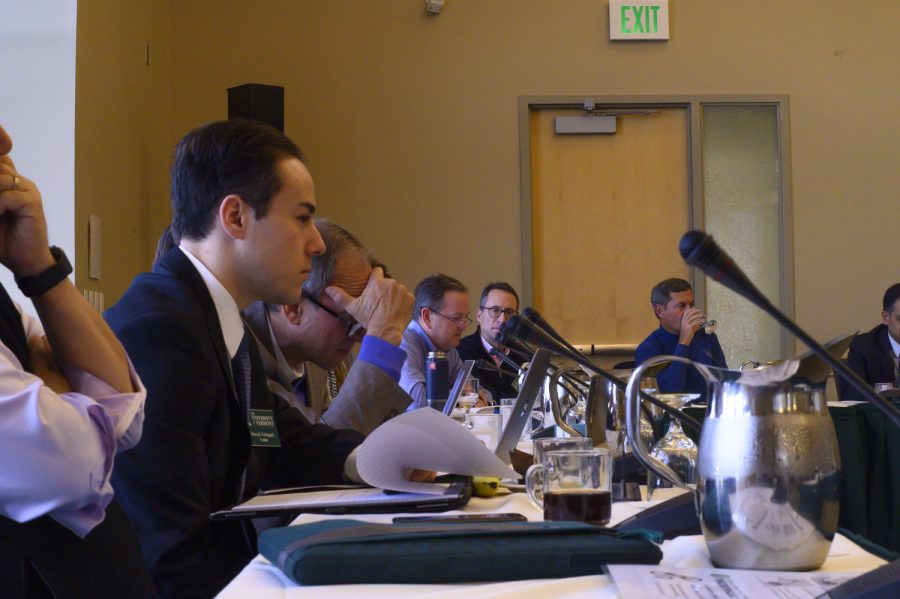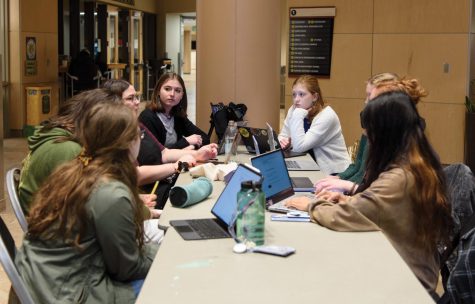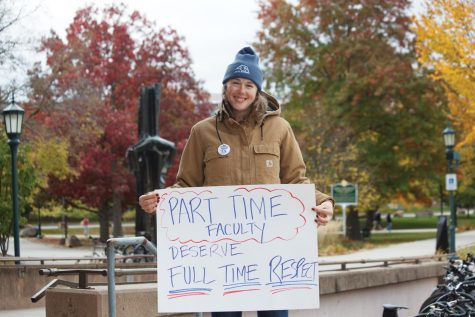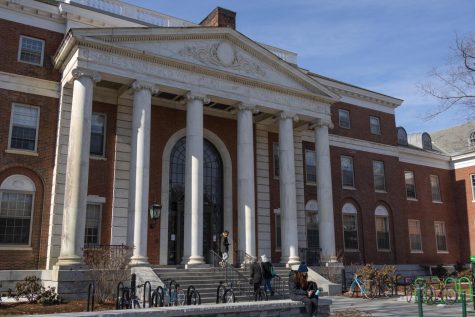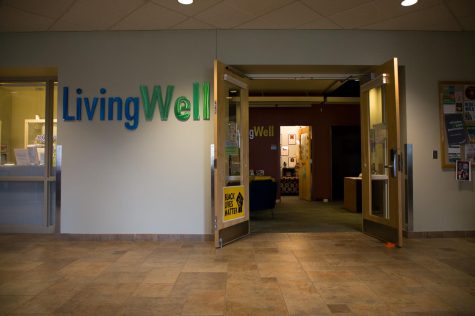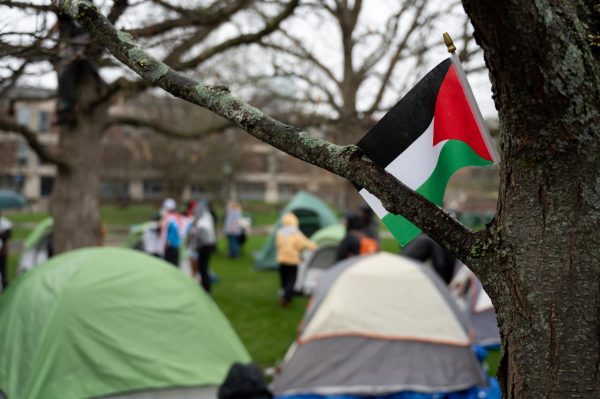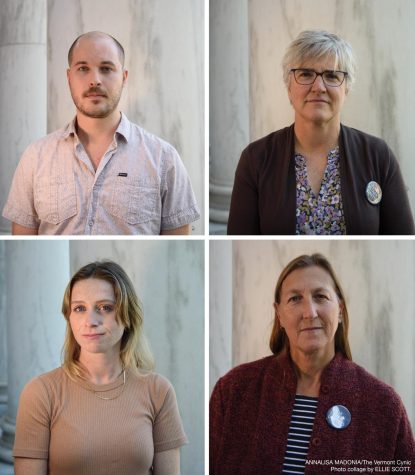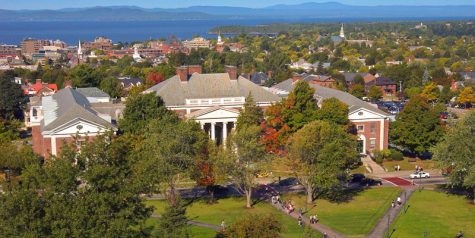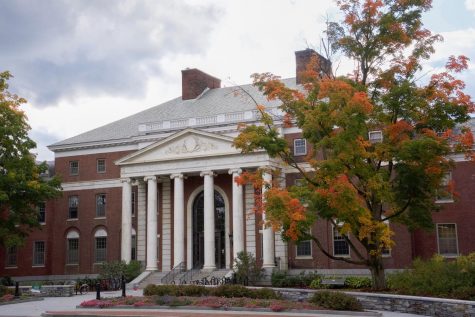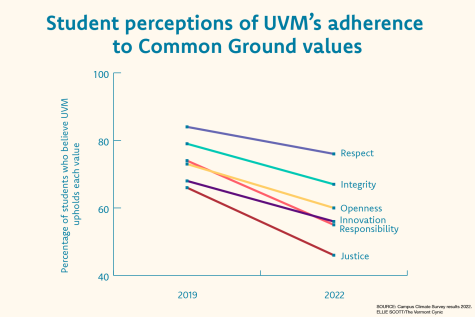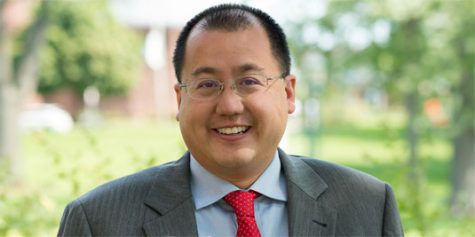Board of trustees affirms zero tuition increase in last meeting of the year
Stephan Toljan/ The Vermont Cynic
Trustees gather for their Oct. 26, 2019 meeting. The board met virtually for their last meeting of the school year May 15.
The UVM board of trustees will not increase tuition for the upcoming 2020-2021 school year despite mounting COVID-19 related expenses.
The board, led by Chair Ron Lumbra, also discussed UVM’s monetary worries, remembering a trustee who lost his life from COVID-19 complications and updates from the sustainability work group in their last meeting of the academic year May 15.
Board discusses the struggling economy, but refuses to increase tuition
The board passed a resolution affirming the 0% tuition increase proposed in the fall, despite discussion of how the economic crisis is hurting UVM investments.
Richard Cate, vice president of finance and facilities, discussed the resolution at the beginning of the meeting.
“As was announced back in the fall, the recommendation is for a 0.0% increase of all tuition levels,” he said. “So the resolution simply is reaffirming the tuition rate that we already have.”
The resolution was accepted, carrying the 2019-2020 tuition rates into the 2020-2021 school year at $8,196 for Vermonters and $20,640 for in-state students.
UVM is more reliant on tuition than most public research universities, as it pays for 73% of general fund expenditures at UVM, according to an email from President Suresh Garimella May 11.
Although they agreed not to increase UVM’s main source of revenue, members of the Budget, Finance, and Investment Committee discussed the declining market and its potential impacts on UVM’s investments.
“We’re in an extreme environment of volatility, you should fully expect that to continue,” said Don McCree, the chair of the committee. “The pendulum is going to swing widely back and forth,”
Robert Brennan, a member of the committee, explained how public pension funds, or the retirement savings of UVM employees and retirees, are the worst that they have been in years.
That falling of the public pension funds could negatively impact UVM, since UVM’s public pension funds investments have lost value.
UVM looks to Vermont state Senate for help
With increasing tuition costs off the table, board members discussed potential monetary aid from the Vermont state government to help address COVID-19 related expenses.
Wendy Koenig, the director of federal and state relations for UVM, said there is money in the Budget Adjustment Act passed by the Vermont House, however the bill has yet to pass in the Senate.
“There is a little over $5 million in that budget adjustments that will come to UVM,” she said. “If the Senate passes something similar, that is going to be helping us to recover losses related to the reimbursement of room costs and student parking fees.”
UVM has already received $7 million from the U.S. Department of Education through the CARES Act.
However, this is still $16 million shy of the $23 million Garimella asked Vermont Governor Phil Scott for in mid-April to assist with reimbursement costs among other COVID-19 expenses.
Koenig said that while she was on a call with the Senate Appropriations Committee May 14, they indicated that they were working to pass their version of the House bill by May 22.
“I think that the Senate has the intention of trying to include more dollars for the University and reimbursing us for some of our COVID-19 expenses,” she said. “Including ramping up technology costs and some other things.”
Sustainability work group provides updates
The sustainability work group requested a review of UVM’s endowment investments and pushed back their deadline for delivering a final report to the board.
The work group was formed in March by the board to advise them on sustainable options they could make, specifically around divestment, after pressure from student groups.
Carolyn Dwyer, the leader of the group, said they have been working hard on what is an extremely complex issue, despite outside challenges.
“Now we find ourselves working at a time where we face unprecedented challenges as an institution,” she said. “Nevertheless, we’ve continued our work.”
Dwyer said she expects the group to have a final report and recommendation prepared for the next board meeting during the summer.
This is behind schedule for the group. According to meeting materials from their first March 26 meeting, the group was supposed to have a final report ready for the May 15 meeting.
Lumbra thanked Dwyer and the group for all of the work they had done, and said he thinks the group will help to bring everything together.
“We think of ourselves as an environmentally-focused University, a green University as part of our brand and who we are both in the state and the University,” he said. “I think you will, with the administration, help to bring all that together.”
Remembering Bernie Juskiewicz
The Board took time to remember Trustee Bernard ‘Bernie’ Juskiewicz, who died in early April due to complications from COVID-19.
“This crisis is profoundly human,” Lumbra said. “We lost our fellow trustee, Bernie Juskiewicz, along with a foundation board member and others affiliated with the campus community. They will all be missed.”
A resolution was offered in memory of Juskiewicz.
“The University of Vermont board of trustees wishes to include in its official records a special recognition and memory of Bernard ‘Bernie’ C. Juskiewicz, beloved colleague, friend and devoted supporter of the University and a dedicated fan of UVM Athletics,” Lumbra said.
Lumbra said Juskiewicz was a tireless advocate for UVM, and that his contributions and leadership will have a lasting and profound impact.
“Bernie will truly be missed,” he said. “He was a treasure and I will personally miss him. I think about him all the time.”


